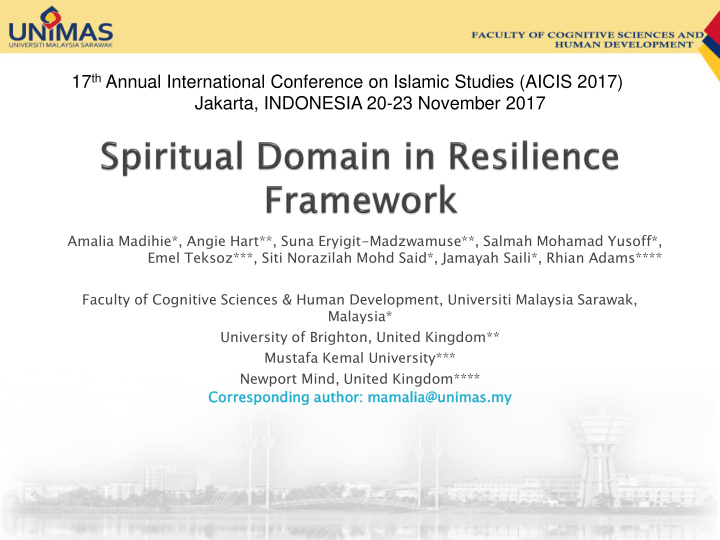



17 th Annual International Conference on Islamic Studies (AICIS 2017) Jakarta, INDONESIA 20-23 November 2017 Amalia Madihie*, Angie Hart**, Suna Eryigit-Madzwamuse**, Salmah Mohamad Yusoff*, Emel Teksoz***, Siti Norazilah Mohd Said*, Jamayah Saili*, Rhian Adams**** Faculty of Cognitive Sciences & Human Development, Universiti Malaysia Sarawak, Malaysia* University of Brighton, United Kingdom** Mustafa Kemal University*** Newport Mind, United Kingdom**** Corres respon onding ng auth thor: or: mamalia ia@un unimas mas.my
Our Resilience Research Team 2
Introduction on Study Resilience Theories Resilience The Magic Box Framework Adolescent Identity ◦ The Spiritual Domain: Meaning of Life Methodology Finding & Evidence Implications Conclusion References Acknowledgement 3
A research rch co colla laborati boration on started in 2016 on Resilience Studies between three universities: Universiti Malaysia Sarawak (UNIMAS), MALAYSIA, Brighton University, UNITED KINGDOM, & Mustafa Kamel University, TURKEY – Integrate in COUNS NSEL ELLING LING PERSPECTI ECTIVE VE Exploring Exploring Developing Resilience Cross- Resilience Domains Cultural Tool Aspects Resilience The Magic Box Psychometric 4
As overcoming adversity, whilst also potentially subtly changing, or even dramatically transforming (aspects of) that adversity (Hart et al., 2013b; 2016) 5
A ‘bounce back’ state in individuals: adapt and adopt after any adversities, setbacks, changes, and/or obstacles in life (Amalia Madihie, Sidek Mohd Noah, Maznah Baba & Wan Marzuki Wan Jaafar, 2015) 6
Cognitive Affective Behaviour (Feeling) 7
Theorist rist Defin initi tion n Theory ry Empirical al Implicati tion on for Support Thera rapy py Rutter (2006) An interactive Isle of Wright Consider concept that is and London genetic and concerned study (Rutter, environmental with the 1979) pathways to combination psychpatholog of serious risk Comparison of y experiences children in and a two different Identify relatively settings aspects of risk positive that psychological Strong focus contribute to outcome on causation despite those competence experiences Maintain challenge to developing coping skills Introduce turning points
To refine the Resilience Framework (RF, Hart et al., 2007) – to produce empiri irical cal evi viden ences es and d cultura ural dive vers rsiti ties es using communities of practice approach The RF is a strategic model that promotes wellbeing by acting tactically about where to direct one’s efforts when building resilience (2007). 9
Protective Factor(s) Risk Factor(s) 10
The Magic Box 11
Accepting • Starting point of children/families Conserving • Any good that has occurred hitherto
Commitment • Working with them over a sensible time period Enlisting • Appropriate others to help (referral)
It is a comprehensive framework which integrates both theory-driven and practice- based knowledge; and covers major domains of life including: Basics Belonging Learning Coping Core Self 16
17
Illness-related Risk Individual Risk 1.Uncertainty in Illness 7. Defensive Coping 2.Disease and symptom- related distress Outcome 10. Resilience Individual Family Protective Protective Outcome 3. Family Atmosphere 8. Positive Coping 11. Quality of Life 4. Family Support Resources Individual Social Protective Protective: 9. 5. Social Integration Derived Meaning 6. Health Care Resources Hasse (2014) 18
OUTCOMES: Resilience & Quality of Life Self- Meaning (of Life) Reliance Existential Equanimity Perseverance Aloneness 19
The scientific of human subjectivity (their view) Q Methodology (Q) is a complete methodology which involves technique (sorting), method (factor analysis), philosophy, ontology, and epistemology 20
Malaysia: 100 samples UK (England & Wales): 200 samples Turkey: 100 samples Inclusive Criteria: Both genders 1. Aged between 13 – 17 years 2. Well-literacy 3. 21
KID IDSCRE CREEN EN-10 Index ex: This scale provides a unidimensional health related quality of life index for children and young people between 8 and 18 (Kidscreen Group, 2006) Multid tidim imensional nsional Soci cial al Support ort Sca cale: It is a 12 item scale that measures perceptions of social support adequacy from three specific sources, family, friends and a significant other (Zimet, Dahlem, Zimet, & Farley,1988) Satisfa sfaction ction with Life e Sca cale: : This five item scale aims to assess one’s global judgement of his/her satisfaction with life (Diener, Emmons, Larsen & Griffin, 1985) 22
Stage ge 1 (Q-sort sort analy lysis sis): ): A factor analyse of participants’ q -sorts was completed in order to identify similar orders of ranking/sorting. ◦ Each factor was then analysed through interpretation of factors qualitatively In-depth St Stage ge 2 (S 2 (Survey urvey analysis): lysis): Data from three surveys was investigated for their internal consistency. Next, whether the factors derived from q-sort explained the variation in health related quality of life, social support and life satisfaction of the sample 23
Eight factors were driven from the Malaysian q-sorts. Items related to beliefs and Spiri rituali tuality ty we were e ranked nked high ghest est in all factors whereas items related to Basics and Belonging were the differentiating elements of the factors. 24
Therefore, the findings suggested that basic and belonging domains are significantly more crucial compared o Coping, Learning and Core Self domains; and the need for a Spiritual iritual ele lement ment to building resilience is essential in Malaysians’ resilience building 25
The non-clinical Resilience Assessment Tool can be administered by counselling and school staff. ◦ They can therefore play an instrumental role in identifying the domains of resilience needed to build the resilience of young people and in planning interventions. 26
Resilient Therapy Intervention (Amalia Madihie et al., 2015) is developed, experimented, a non-clinical tool, and ready to apply to all kind of individuals via psychoeducational approach in counselling and/or professional helpers The Resilience Scale (Malay version) translated by Amalia Madihie et al., 2011 is validated and reliability checked- ready to be administratered 27
Spiritual-Resilience domain can be suggested as the sixth domain in the Magic Box Model a.k.a. Resilience Framework. The study has contributed empirical evidences to the field. 28
Short Term Grant, Universiti Malaysia Sarawak (UNIMAS), MALAYSIA F04/SGS/1480/2016/08 Brighton University, UNITED KINGDOM Mustafa Kamel University, TURKEY Newport Mind, UNITED KINGDOM 17th Annual International Conference on Islamic Studies, Jakarta, INDONESIA 20-23 November 2017 29
Q & A Session 30
Recommend
More recommend